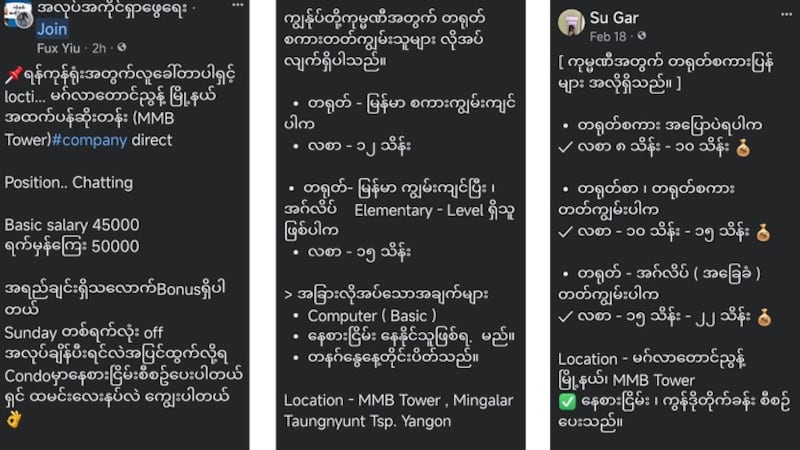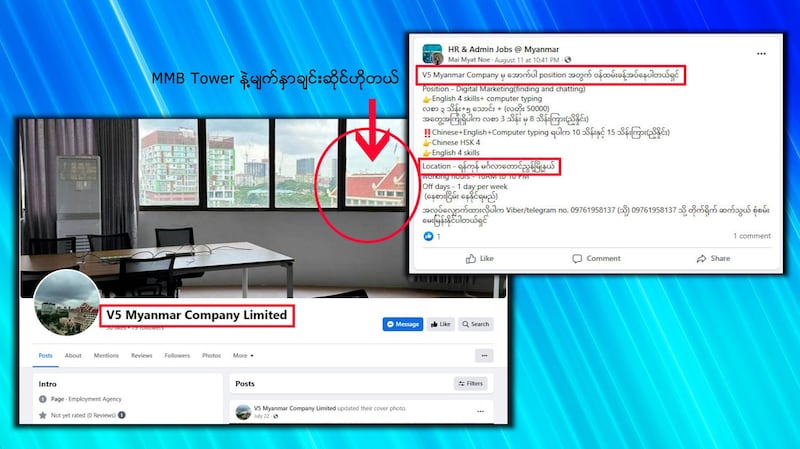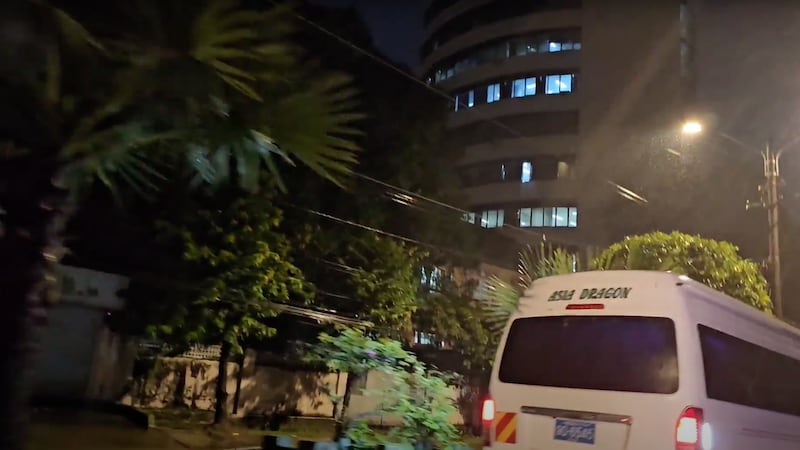The first hint Soe Thun* had that his online sales job might not be exactly as advertised was that the hiring process lasted just a few minutes and took place over a voice messaging app. His recruiter, who gave her name as Lisa, told Soe Thun to send her a paragraph of biographical information. Once that was done, she offered him the job.
“So what time can you come to the office?” she asked, her voice almost inaudible amid a call center din, via a voice message shared with Radio Free Asia. “I am sending the address.”
That address was MMB Tower, a prominent office building located in the heart of Yangon. And the job, Soe Thun learned when he showed up to work the following day, was to join scores of others from Myanmar, Laos, Vietnam, China and Thailand in helping hack into the bank accounts of unsuspecting lonely hearts.
Cyber scam operations have proliferated across Southeast Asia, with hundreds of thousands people believed to be involved — some voluntarily, many not — in cajoling, stealing or blackmailing billions of dollars annually from their victims, according to UN estimates.
In Myanmar, these compounds are usually found in lawless areas like Myadawaddy township along the Thai-Burmese border, and in remote regions like Kokang, in northern Shan state, which borders China. Typically run by Chinese organized crime rings, Myanmar scam operations have been growing in number since the February 2021 military coup, with countless stories emerging of children and adults trafficked, abused and tortured while being forced to scam more victims. According to a recent U.N. report, at least 120,000 people are forcibly employed in the cyber scam industry in Myanmar alone.
But an investigation by RFA Burmese suggests scam centers are now operating in central Yangon. Unlike in the remote compounds, workers at MMB Tower spoke of a highly formalized business operation that involved no abuse. Instead, those running the scams appear to rely on a nearly limitless pool of educated, unemployed Yangon residents, with experts saying the operation shows both how lawless Myanmar has become and how deeply the economy is suffering.

A building with a storied past
Located just meters from the bucolic Kandawgyi Lake, MMB Tower occupies a prime piece of real estate on Upper Pansodan Road. A hulky, cylindrical tower whose cream-colored facade has seen better days, MMB is surrounded by a mix of serviced apartments and modest flats. Just across the street lies the four-star Rose Garden Hotel, a large building whose distinctive red spires offer an attractive vista for anyone looking out of the MMB windows.
It is unclear who currently owns MMB. But it once served as the headquarters of Myanmar Mayflower Bank, owned by the prominent tycoon Kyaw Win. The bank was shuttered by the government in 2005, 11 years after its launch, and two years after the U.S. government sanctioned it for money laundering. Kyaw Win, the U.S. noted, had links to drug trafficking and the United Wa State Army. UWSA, the largest armed ethnic organization in Myanmar, is the armed wing of Wa State — an autonomous zone in northern Shan state. The army is also notorious for its Golden Triangle narcotics operations, with several of its leaders having been indicted by the U.S. government.
The fifth floor of MMB once housed Yangon Airways, which a few years later was added the U.S. Treasury Department’s sanctioned list under the narcotics trafficking program. That airline was owned by Aik Hawk, who is the son-in-law of the leader of UWSA and is believed by local analysts to be a business partner of Kyaw Win.
In April 2022, a company named Win Win International E-Commerce registered its business, giving its address as MMB Tower. Its principal activities are listed in Myanmar’s corporate registry, or DICA, as telecommunications, computer programming, information services and travel planning. Win Win now boasts a prominent sign at the base of MMB, the only company to have signage outside the tower. Calls to the number Win Win listed on DICA were answered by a woman who said it was a wrong number.
The building has been recently renovated. Photographs posted to Facebook in November 2022 by a Myanmar construction company touting “renovation work for the whole building” show knocked down walls, new carpets and rows of desks topped with computers still encased in wrapping paper.
In October 2022, postings for jobs in MMB Tower began appearing on Facebook, Telegram and Viber, the messaging app through which Soe Thun was hired. The positions include jobs like online sales, marketing and receptionists. Many ads call for Chinese speakers or English speakers. While most offer a base salary around 500,000 kyats, or $142, a month, a trilingual applicant is promised as much as 3 million kyats, or $857 — a significant income in a country where the minimum daily wage is 4,800 kyats, currently worth about $1.37.
Calls to these recruiters went unanswered, and it is unknown whether all the posted jobs were illegitimate. RFA spoke with three people who said they had worked as scammers in the building, all of them on the fifth floor. While their accounts couldn’t be independently verified, all shared similar details about the recruitment process, the office set up, and how the scams operated. Each claimed that almost every floor of the tower held scam operations, with Soe Thun estimating that upwards of 350 people worked on scams, though that could not be verified.
At least two of the people RFA interviewed had been hired through a firm called V5. Its Facebook page, while bare of many details, featured a banner photo looking out from inside the MMB Tower, the tall spires of Rose Garden neatly framed. One day after RFA Burmese released its first Burmese language story about scamming operations in the tower, the photo disappeared from V5’s Facebook page.

Hard at work on floor five
When Mya Sein* reported to her job in early August, she was shown to a desk, given an old model iPhone and handed the details to a slew of social media accounts.
“Too many,” she said in a recent interview. “I was confused and had a big headache. They gave me six Facebook [accounts], two Instagram accounts and two WhatsApp. I could not use them all.”
Soe Thun said he managed Facebook, Instagram, TikTok, Telegram and WhatsApp accounts “and three or four others that I don’t remember.”
Once the recruiters confirmed their English and typing skills were adequate, the new employees were trained how to seduce victims by Shan, Bamar and Chinese managers.
Thane Myint,* who also worked on the fifth floor of MMB, said scammers were instructed to find victims through a range of dating and friendship apps including Tantan, which boasts the “largest Asian singles community”; Tagged, billed as a place to chat and play games with strangers; and Meeff, which is a global language exchange app.
“We make friends first with them by asking their ages and jobs. A few days later, we give them a WhatsApp account and make a call. Then, we have to have chats with them,” Thane Myint said. “There are two types: relationship and friendship. I prefer the former.”
Soe Thun described his phishing work as relationship-oriented, explaining that part of the job was to have “sex chats” with would-be victims. Soe Thun said he was told to speak primarily with Indonesians, while Thane Myint said he was instructed to avoid reaching out to “engineers, IT technicians or people in their 20s” and instead to target “business people” from Indonesia and the Philippines who were at least 30 years old for investment opportunities.
When a certain level of trust was reached, the scammers said they would ask their marks to either click on a link or download a piece of software before urging them to make a purchase through their bank account. Through that, malware could access their passwords and drain their accounts.
After, the scammers move on to the next victim, said Thane Myint, and the hackers take over.
“Other people continue to take responsibility for the rest,” he said.

An economy in shambles
Soe Thun, who previously worked at a government agency, never imagined he would spend his days cheating people out of their money.
When he reported to his first day of work at MMB Tower and discovered the nature of the job, he considered quitting but ultimately decided that he needed the salary too much.
“At that time, I had decided not to work there, but I had difficulties making a living. So, I decided to work there for a month and to get a fare to go back to the countryside. With that intention, I worked there,” he said.
The monthly pay was listed as 450,000 kyats, or $129. There was a dining room on the ground floor and workers slept nearby. Workers were free to come and go as they pleased, he said, as long as they signed in and out. Soe Thun initially worked six days a week, 9:30 a.m. to 9:30 p.m., with an hour for lunch. The first seven days were considered an “intern period” for which he was not paid.
“According to labor laws, they had to pay from the starting date,” he said. “But we could not ask for compensation because we knew that it was an illegal business.”
Jason Tower, country director for the Burma program at the United States Institute of Peace, who has studied cyber scam operations in Myanmar said there had been a significant increase in scam operations countrywide post-coup.
“With the military losing ground rapidly to the resistance and fighting intense wars across the entire country, it is increasingly desperate to identify sources of funds to maintain its war campaign. As a result of these factors, the entire country is now highly susceptible to illicit influence, and transnational criminal actors have become increasingly embedded across all of Myanmar,” he wrote in an email.
Myanmar’s economy has shrunk by 12 percent since the February 2021 coup. The black market rate of the kyat dropped 300 percent against the dollar during that time period, sending the cost of food surging. As a result, more than 60 percent of the population now lives below the poverty line. And while some nations like China and Thailand continue to do business with the military regime, a substantial exodus of foreign firms has left a mark on the country, particularly on the business center of Yangon.
Scam operations routinely migrate across the region and within countries. A recent report by International Crisis Group cited relocations following crackdowns in Cambodia, Laos and elsewhere, as well as compounds moving within Myanmar’s borders.
Thomas Kean, a senior consultant for Myanmar with International Crisis Group, said that it would make sense that some scam operations might migrate to Yangon, pointing to both lawlessness under the junta and an abundance of office space whose electricity comes at a relatively low cost thanks to government subsidies.
“I can’t say for sure it’s going on, but I wouldn’t be surprised. The rule of law situation has deteriorated significantly. Corruption has increased. There’s very little enforcement of the law so there’s fewer risks in accepting bribes,” he told RFA. “There’s a lot of unemployment in Yangon right now, so these jobs are not going to be unattractive necessarily.”
The scammers at MMB said they had heard of similar operations at several other office buildings, which could not be verified. But RFA spoke with a man who said he worked for two months as a cyber scam recruiter on the 15th floor of Junction City, a sprawling plaza that includes a mall, condos and a 23-story office tower.
“I used to work in one of those companies… We have to find people who will lie to go work in Laukkai and Myawaddy," he said, referring to two known hotspots of cyber scam operations, the former in northern Shan state and the latter on the Thai-Myanmar border.
“After the 2021 coup, these [recruiting] businesses are located in central areas of Yangon,” the man said. “In other words, in the places where famous companies are headquartered, they tend to be interspersed like that.”
Some of those who have shown up in the fifth floor offices of MMB know what they are getting into while others learn upon arrival, said Thane Myint.
“The reason is shortage of jobs. If you get one, the salary may be 100,000 or 200,000 [kyats]. Here it starts from 500,000 kyats. You will be paid an extra 50,000 kyats based on attendance. If you can find a client, you can pay more, some of them get 700,000 or 800,000 kyats. And you can have four meals per day. You will be provided with a refrigerator and an air conditioner.”
The pay is likely attractive to many. Mya Sein said her office was in operation “day and night,” with workers on other floors employed in the night shift.
While Soe Thun and Mya Sein both left after just a few weeks, unhappy at the thought of scamming people for a living, Thane Myint was still working on the fifth floor earlier this month. In a recent interview with RFA Burmese, he referred to those who he chats with as “clients” and insisted he “is always praying that [they] are not defrauded.”
But he admitted the appeal of a steady income has trumped other considerations.
“Like others, I take the job temporarily while I have no other job opportunity.”
Unknown future
RFA ran a version of this story in Burmese on Sept. 5. Three days later, Thane Myint told RFA that he and his colleagues were told to leave the buildingand that the computers and office equipment were taken away. Calls to Thane Myint have gone unanswered since then and it is unclear whether the scam center has reopened.
“They are extremely on alert after they were exposed in the report,” he said at the time. “They are very cautious now.”
*Names have been changed for security reasons.
Additional reporting by Abby Seiff. Edited by Abby Seiff, Jim Snyder, and Mat Pennington.
